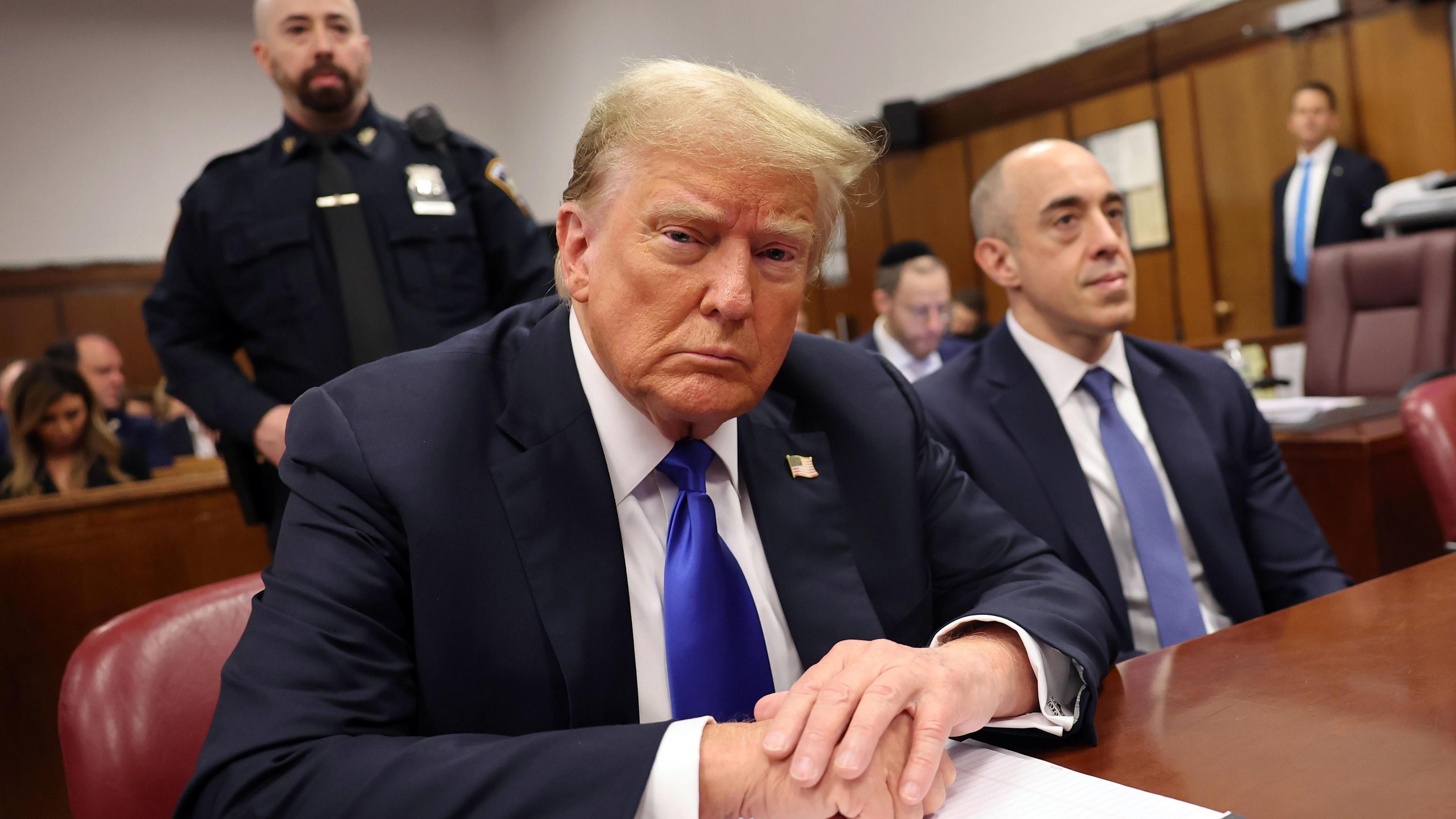Trump sentencing in hush money case could be delayed

Donald Trump called May's verdict in the New York case a "disgrace"
- Published
Donald Trump's 11 July sentencing in his hush money case may be delayed after his lawyers asked the judge to set aside his conviction in the wake of Supreme Court's immunity ruling.
In a letter to Justice Juan Merchan, Manhattan prosecutors said that while they believed Trump's motion to overturn his conviction to be "without merit", they did not object to his request to delay the sentencing.
The Supreme Court on Monday ruled that presidents have broad immunity from criminal prosecution for "official actions" they take while in office.
In May, Trump's conviction on 34 counts of falsifying business records was based in part on evidence of meetings and communications that occurred while he was president.
A letter sent by Trump's lawyers to the judge cites Monday's ruling that granted the former president immunity from prosecution for "official actions" he took while in office.
Manhattan prosecutors have asked that the judge respond to Trump's motion by 24 July.
Judge Merchan must now rule on whether to formally adjourn the sentencing.
What the Supreme Court immunity ruling means for Trump... in 60 seconds
Trump's team points out that the former president signed off on the records in the hush money case while in office in 2017, but one lawyer suggested this was unlikely to be considered an official act.
His lawyers also argued that during his Manhattan trial, prosecutors shared "highly prejudicial" evidence that should have never been presented to the jury because it was from during his time in the White House, including Trump's 2017 social media posts and testimony about events in the Oval Office.
"The verdicts in this case violate the presidential immunity doctrine and create grave risks of 'an Executive Branch that cannibalizes itself,'" Trump's lawyers Todd Blanche and Emil Bove wrote in the letter to Justice Merchan.
Last year, Trump's lawyers similarly argued that the allegations in the case involved that were within the scope of his official presidential duties.
However, a federal judge wrote that Trump had failed to show that his conduct was "for or relating to any act performed by or for the President under [scope] of the official acts of a president".
Monday's ruling by the Supreme Court was hailed by Trump as a "big win" for democracy.
The justices ruled that a president had immunity for "official acts" but was not immune for "unofficial acts".
That ruling related to a separate case against Trump: he is suspected of trying to illegally overturn the 2020 presidential election result that gave victory to Joe Biden.
Reacting to the Supreme Court ruling, President Biden described it as a "dangerous precedent" that undermined the "rule of law" in America.
Trump has some immunity from prosecution, Supreme Court rules
- Published1 July 2024
Justice's dissent: 'The President is now a king above the law'
- Published1 July 2024
A guide to Trump's four criminal cases
- Published28 August 2024
In May, a panel of 12 Manhattan jurors unanimously convicted Trump on all counts of falsifying business records in the hush money case..
During the trial, the court heard from a number of witnesses, including former adult film star Stormy Daniels, whose alleged sexual encounter with the former president was at the centre of the case.
The former president was accused of having concealed a payment to buy the silence of Ms Daniels in the final days of his 2016 election campaign.
Prosecutors had argued that, by approving a scheme to disguise the money as legal expenses, Trump broke election law.
Trump called the verdict in the New York case a "disgrace".
Justice Merchan would likely agree with a delay in the sentencing, but the Supreme Court decision is ultimately unlikely to affect Trump's conviction, said Mark Zauderer, prominent appellate attorney in New York.
"The allegations in the New York fraud case in which Trump was convicted seem clearly to relate to unofficial conduct by Trump, none of which would seem to involve his official duties," he told the BBC.
"While Trump will be able to litigate his immunity defence in some of his cases, he will have a most difficult time succeeding with this argument in the New York case."
Additional reporting by Kayla Epstein and Madeline Halpert in New York.